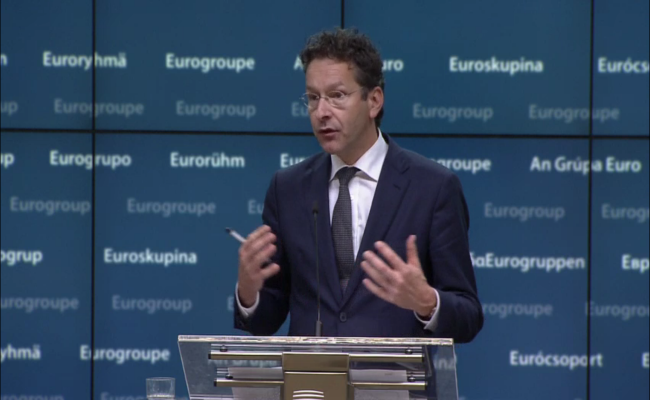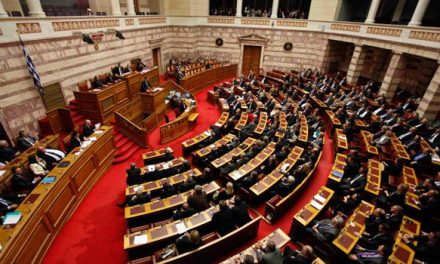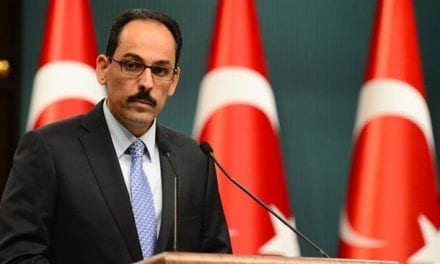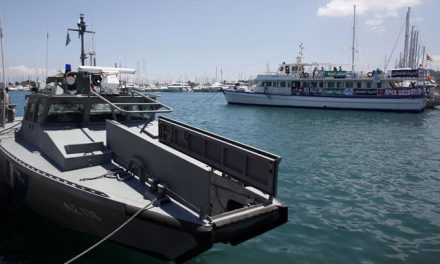By Bloomberg, Athens
Euro-area member states agreed to disburse the funds necessary for the recapitalisation of Greece’s battered banks, as Prime Minister Alexis Tsipras sought consensus from opposition parties, following defections that whittled down his slim parliamentary majority.
Finance ministry officials from the currency bloc agreed “that the Greek authorities have now completed the first set of milestones and the financial sector measures that are essential for a successful recapitalisation process,” Dutch Finance Minister Jeroen Dijsselbloem said in a statement on Saturday.
The agreement allows the board of directors of the euro area’s crisis funds to transfer the “funds needed for the recapitalisation of the Greek banking sector out of the €10bn earmarked for this purpose,” said Dijsselbloem, who also chairs the meetings of finance ministers from the currency bloc.
The decision followed the approval of a bill on Thursday night in the Greek parliament that eased restrictions on foreclosures, introduced a tax on wine and overhauled bank governance rules. The vote took a toll on Tsipras, as two lawmakers refused to back the bill and were expelled from his caucus in parliament, eroding his majority to three seats.
The mini-mutiny doesn’t bode well for Tsipras’s political longevity just two months after winning a snap election. It also adds pressure on his government to muster enough votes and push through additional belt-tightening measures and cost-cutting overhauls in the country’s pension system that are conditions for further financial assistance.
The 41-year-old Syriza party leader said in an interview with Ethnos newspaper on Saturday that his coalition with the nationalist Independent Greeks party is stable and his majority in parliament safe. Yet he said the government will table its proposals on major overhauls, including pension and education reform, to “all political forces,” seeking to foster consensus.
“Deep reforms require wider consensus and I want to believe that most political forces are ready for this discussion,” the former firebrand opponent of bailouts said. Following an internal ballot for the election of a new leader of the main opposition New Democracy party, scheduled for yesterday, Tsipras said he would call the new leader to discuss the need for consensus as “dialog is a basic ingredient of democracy.”
The vows to seek opposition backing are a far cry from Tsipras’s previous rhetoric. He led dozens of rallies against the austerity measures he’s now forced to implement, when he was in the opposition. As late as July, he asked Greeks to reject the measures attached to the country’s bailout, in a referendum which pushed Europe’s most indebted state to the brink of being expelled from the euro.
The standoff brought Greece’s financial system to its knees, leaving lenders with a €14.4bn capital shortfall, according to the result of a review carried out by the European Central Bank, amid increases in sour loans, expensive emergency funding requirements, subdued economic activity and strict capital controls.
About €6bn of the hole will be covered by emergency loans under Greece’s bailout agreement, as neither the National Bank of Greece nor Piraeus Bank managed to raise all the funds needed from private investors. Eurobank Ergasias and Alpha Bank also said that the allocation of new equity to investors was subject to Greece reaching an agreement with creditors on the disbursement of the next tranche of bailout funds.
The agreement on Saturday, which includes €2bn to be used for Greek budget financing, “contributes to restoring confidence on the Greek economy,” Dijsselbloem said in his statement.
The funds for capital injections to Greece’s two biggest lenders will be disbursed following regulatory approvals of state aid decisions and restructuring plans. The €2bn for the Greek budget will be disbursed today, following a decision by the board of directors of the European Stability Mechanism, according to Dijsselbloem.



















